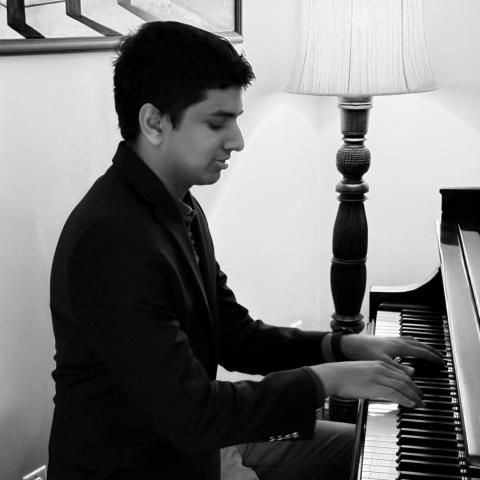Can You Write an Uplifting Song About the Climate Crisis?

Zitong (Selina) Zhang
Sixth-semester student Zitong (Selina) Zhang took inspiration from the beauty and vulnerability of the world around her to write her new song “Life,” a meditative reflection on the cycles of life and the impact of climate change.
A songwriting major from Beijing, China, Zhang submitted the song as an entry for Berklee's Songs for Social Change contest, impressing Mark Simos, the contest's faculty facilitator. She also performed the song at the recent Earthapalooza showcase with a nine-piece backing band helping to drive home the powerful effect of lyrical refrains such as, “Life is endless, day and night,” and, “Praise life and release nature.”
Berklee's Media Relations team spoke to Zhang about the inspiration and creative process that goes into writing a song about such a difficult topic, as well as the tools she's learned from Berklee to enhance her musical and creative abilities.
Listen to “Life” on Berklee's Songs for Social Change SoundCloud playlist and watch Zhang's Earthapalooza performance on Vimeo (at the 2:22:00 mark).
You submitted the song “Life,” a reflection on climate change and its impact on our world, for this year’s Songs for Social Change songwriting competition. Why did you choose this subject for your submission?
The reason why I submitted “Life” is because I think social change can be expounded and acted upon from various perspectives and angles in a broader scale, among which climate change and its impact on our world would also be an inseparable part of social change. Imagine as if our whole society is an organic organism, and every department of the organism existed for the survival of each organic entity. Whether we are flowers or trees, animals or humans, we are an indispensable component of this life circle.
What inspired you to write “Life”? I particularly loved your descriptions of nature’s many wonders followed by lyrics like “appear, disappear, survive, destroy”—how did you come up with this contrast? How do you reflect this contrast in your performance?
From a literal perspective, the special inspiration of this song stems from the precious and priceless natural landscape that we can see every day in our daily routines, but coincidentally becomes the most easily ignored part of the world for us. For example, as mentioned in my lyrics, “earth, sky, mountains and rivers; jade tree, scorching sun, wind flower, snow moon,”—their changing processes, a result of climate change, are reflected in the lyrics “appear, disappear, survive, destroy.”
All things in the world have balance, and balance is harmony. In the performance, the most obvious way I reacted to this contrast is the change from the last chorus to the outro. With the increasing speed of the chorus and the continuous rising tone, the appeal becomes increasingly stronger and stronger, and particularly conveys the message of life being like a wave with an ebb and flow—until the final part of the outro expresses that we will find “the unity of life” when we return to the purest and most tranquil spaces in our hearts.
You performed with nine backing musicians at this year’s Earthapalooza concert. How did you conceptualize the instrumentation of the song?
For the instrumentation of this song, each instrument plays their own unique language. In addition to several indispensable but traditional musical instruments, one highlight is the addition of several national percussion instruments, such as the Chinese kit, gong, and rain stick. The arrangement of [the song's] instrumentation is not convoluted; it interprets cultural charm while also highlighting musical expressiveness. I have always wanted to better integrate the traditional culture and music of China and show it to an audience. This is inter-complementary to the big topic of “Life.”
I want to thank Associate Professor Kevin Block-Schwenk for giving me this special opportunity to perform. And I also appreciate my excellent band—I couldn't have done this without them!
Has anyone at Berklee—faculty, staff, or student—influenced your performance style and themes in your music throughout your time here?
My studies at Berklee have made a great impact on my performance and music style. They have given me the drive to constantly explore and practice relentlessly. In particular, I would like to thank several people who have had a far-reaching impact on me and my mindset. The first is Associate Professor Ben Camp. I think he is very special, resourceful, and talented. I feel so grateful that I took his course, Stealing from the Masters, last semester. The content of this class is divided into three parts: past, present, and future. In the future section, it unconsciously had me thinking, “What will the future development of Chinese music be like?” And it became one of the driving inspirations for me to complete “Life.”
I would also like to thank Rob Lewis [’94] and Ash Rodriguez [B.M. ’10]. In their event for Career Jam, The Show, the whole process of the concert was like a hallmark, offering profound help and influence on my current and future musical path. They urged us to think and helped us translate our visions into live performances. Rob and Ash also encouraged us to constantly uncover and improve our uniqueness by discovering our most suitable place in the ever-changing music arena. I love them so much! Truly, every professor, student, and the whole environment of Berklee has had an influence on me.
What is coming up for you next, both in your studies at Berklee and in your own creative pursuits?
I graduate from Berklee in a year. I feel that time is fleeting! However, what I can be sure of is that I will try my best, make every minute count, and seize every opportunity to strengthen my characteristics as an artist by practicing more and constantly staying on the road of self-improvement and advancement. I am a music enthusiast, and music is my lifelong exploration and endeavor.




